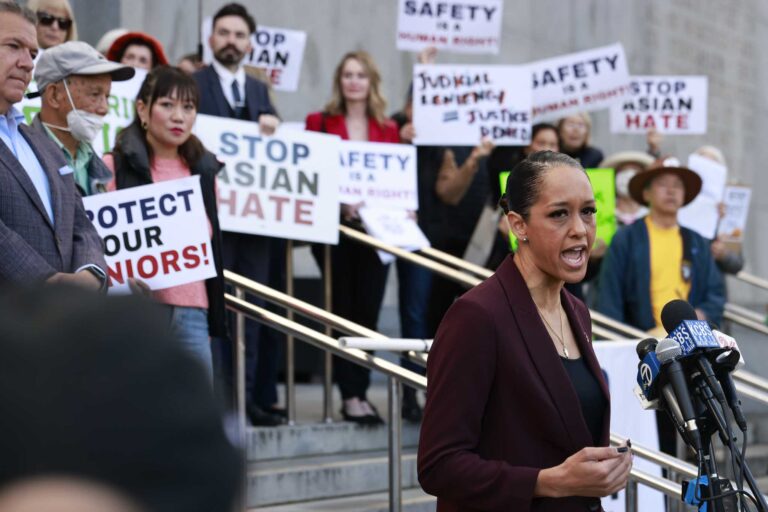Judicial Criticism and Public Protests in San Francisco: A Closer Look
San Francisco District Attorney Brooke Jenkins speaks at a rally in 2024 protesting the sentencing of Daniel Cauich, who received probation for the 2021 stabbing of 94-year-old Ahn Peng Taylor. She has publicly challenged the decisions of certain city judges.
Photo credit: Jessica Christian/S.F. Chronicle
District Attorney’s Criticism of Judges
In a recent exchange, San Francisco District Attorney Brooke Jenkins addressed concerns regarding judicial decisions in cases where her office was involved. Jenkins has been vocal about her disappointment with some rulings, highlighting a perceived disconnect between the outcomes and public safety.
Critics argue that her position as a district attorney may present a conflict of interest. It has been suggested that her role obligates her to uphold the judicial process rather than critique it openly when outcomes are unfavorable to her office. The essence of this critique suggests that, while transparency and reevaluation of judicial decisions are essential, the vessel of this feedback should come from a neutral standpoint, rather than an interested party.
Public Protests and Their Impact
Beyond judicial matters, community protests have sparked significant debate. A recent protest outside UCSF Benioff Children’s Hospital organized by the AFSCME 3299 union drew criticism for its location and approach. Demonstrators utilized loud chants and drums, which, while part of their expression, potentially disrupted young patients and their families within the hospital.
Former state senator Jerry Hill expressed his dismay regarding this demonstration strategy. He emphasized the need to balance the right to protest with consideration for vulnerable populations, particularly in sensitive areas such as hospitals where patients are already under stress and anxiety.
Shifting Focus to Rehabilitation
Amid these discussions, there’s also a shift in focus towards rehabilitation within the prison system. The California government, under Governor Gavin Newsom, is pushing for a transformation of San Quentin into a rehabilitation center, aiming to provide incarcerated individuals with a second chance rather than mere punishment.
Advocates for this initiative argue that rehabilitation not only offers a moral solution but also seeks to reduce recidivism, creating a safer society overall. They contend that providing support and opportunities for personal growth benefits both the individuals involved and their communities.
Contemporary Political Sentiments
In the political arena, discussions persist regarding former President Donald Trump and his supporters’ views. Some commentators challenge the rationale behind supporting Trump, especially in light of his policies and the impact they have had on various marginalized groups. There remains an appeal for supporters to articulate the specific accomplishments they attribute to his leadership.
This political dialogue highlights the broader implications of public sentiment toward leadership and governance, reflecting diverse perspectives on historical and current policies.
Conclusion
As San Francisco navigates complex issues surrounding judicial accountability, public demonstrations, and criminal justice reform, the dialogue continues to evolve. Stakeholders from various sectors must strive for a balanced approach, ensuring that the voices of all community members—including those of vulnerable populations—are heard in these critical discussions.



